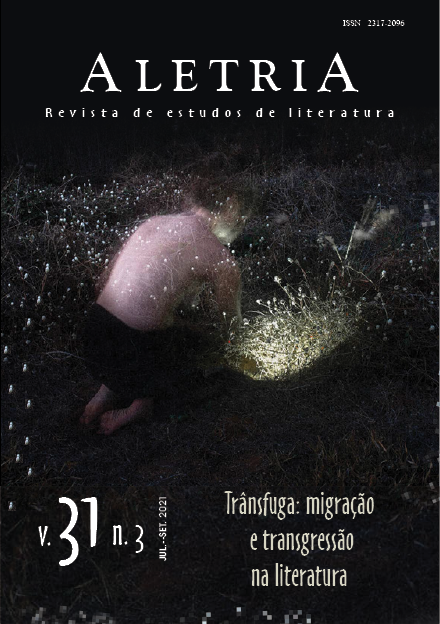The Notebook and the Pencil, Contemporary Indigenous Weapons
A Reading of Canumã, a Novel Written by Ytanajé Coelho Cardoso
DOI:
https://doi.org/10.35699/2317-2096.2021.27030Keywords:
Ytanajé Coelho Cardoso, indigenous literature, traditional knowledge, academic knowledgeAbstract
In Canumã:a travessia, a novel written by Ytanajé Coelho Cardoso (2019), a munduruku family migrates from the village to the city. The decision is motivated by changes in the traditional way of life. These changes were caused by the strengthening of the relationships with the non-indigenous world. In this context, formal education is resignified as an indigenous weapon in the fight against ethnocide. Considering the movements between village and city, traditional and academic knowledge, life and literature, I will discuss the images of formative processes inscribed in the novel, and the possibilities of building a dialogue between cultures, forms of knowledge, and worlds, in which differences are not hierarchical.
Downloads
References
ALMEIDA, Maria Inês de. Desocidentada: experiência literária em terra indígena. Belo Horizonte: Editora UFMG, 2009.
CARDOSO, Ytanajé Coelho. Canumã: a travessia. Manaus: Editora Valer, 2019.
CARDOSO, Ytanajé Coelho. Habitus, dialogismo e resistência no discurso das últimas falantes da língua munduruku do Amazonas. Revista Moara, ed. 50, 2018, p. 125-148.
DORRICO, Julie; DANNER, Leno Francisco; CORREIA, Heloísa Helena Siqueira; DANNER, Fernando (orgs.). Literatura indígena brasileira contemporânea: criação, crítica e recepção [recurso eletrônico]. Porto Alegre: Editora Fi, 2018.
ESBELL, Jaider. Makunaima, o meu avô em mim! Iluminuras, vol. 19, n. 46, 2018, p. 11-39.
GLISSANT, Edouard. Introdução a uma poética da diversidade. Tradução de Enilce do Carmo Albergaria Rocha. Juiz de Fora: Editora UFJF, 2005 (Coleção Cultura, v. 1).
GRAÇA, Antônio Paulo. Uma poética do genocídio. Rio de Janeiro: Topbooks, 1998.
KAYAPÓ, Aline Ngrenhtabare L.; KAYAPÓ, Edson. Amor originário. In: NEGRO, Maurício (org.). Nós: uma antologia de literatura indígena. São Paulo: Companhia das Letrinhas, 2019, p. 15-25.
KOPENAWA, Davi; ALBERT, Bruce. A queda do céu: palavras de um xamã yanomami. Tradução de Beatriz Perrone-Moisés. São Paulo: Companhia das Letras, 2015.
KOPENAWA, Davi. O português é doce como caldo de cana. In: FERREIRA, Helder Perri; MACHADO, Ana Maria A.; SENRA, Estêvão Benfica. As línguas Yanomami no Brasil: diversidade e vitalidade. São Paulo: ISA – Instituto Socioambiental; Boa Vista, RR: Hutukara Associação Yanomami, 2019, p. 151-152.
KRENAK, Ailton. A presença indígena na universidade. Maloca: revista de estudos indígenas, n. 1, vol. 1, 2018, p. 9-16.
MILANEZ, Felipe. Aritana Yawalapiti, 71. Vagalumes: memorial de vítimas indígenas da covid. Disponível em: https://memorialvagalumes.com.br/aritana-yawalapiti-71/. Acesso em: 06 ago. 2020.
NHANDEVA, Alexandro da Silva; ALMEIDA, Tiago Pyn Tánh (orgs.). Tetã Tekoha. São Paulo: Pólen, 2020.
SÁ, Lúcia. Literatura da floresta: textos amazônicos e cultura latino-americana. Rio de Janeiro: EdUERJ, 2012.
SOUZA, Adria Simone Duarte de; BETTIO, Celia Aparecida; CARDOSO, Ytanajé Coelho. Discutindo a literatura indígena a partir do curso de formação de professores indígenas. Revista Cátedra Digital, vol. 4, 2019.
XAKRIABÁ, Célia. Amansar o giz. PISEAGRAMA, Belo Horizonte, n. 14, 2020, p. 110-117. Disponível em: https://piseagrama.org/amansar-o-giz/. Acesso em: 24 set. 2020.
Downloads
Published
How to Cite
Issue
Section
License
Copyright (c) 2021 Suene Honorato (Autor)

This work is licensed under a Creative Commons Attribution 4.0 International License.
Authors who publish with this journal agree to the following terms:Authors retain copyright and grant the journal right of first publication with the work simultaneously licensed under a Creative Commons Attribution Non-Commercial No Derivatives License that allows others to share the work with an acknowledgement of the work's authorship and initial publication in this journal.Authors are able to enter into separate, additional contractual arrangements for the non-exclusive distribution of the journal's published version of the work (e.g., post it to an institutional repository or publish it in a book), with an acknowledgement of its initial publication in this journal.Authors are permitted and encouraged to post their work online (e.g., in institutional repositories or on their website) prior to and during the submission process, as it can lead to productive exchanges, as well as earlier and greater citation of published work (See The Effect of Open Access).





